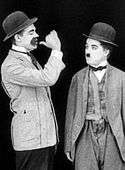Albert Austin
| Albert Austin | |
|---|---|
|
Albert Austin with Charlie Chaplin | |
| Born |
1881 or 1885 Birmingham, Warwickshire, England, UK |
| Died |
17 August 1953 North Hollywood, California, US |
| Years active | 1912–1930 |
Albert Austin (13 December 1881 or 1885 – 17 August 1953) was an English actor, film star, director, and script writer, noted mainly for his work in Charlie Chaplin films.
He was born in Birmingham, Warwickshire, England and was a music hall performer before going to the U.S. with Chaplin, both as members of the Fred Karno troupe in 1910.
Noted for his painted handlebar moustache and acerbic manner, he worked for Chaplin's stock company and played supporting roles in many of his films, often as a foil to the star and working as his assistant director.
After the development of sound films, he moved into scriptwriting, directing, and acting, chiefly in comedy short subjects. Among other things, he assisted Chaplin in developing the plot of The Adventurer (1917). However, he only received screen credit as a collaborator once, for City Lights.
As an actor, he appeared in Chaplin's comedies for the Mutual Film Corporation. Later he had two brief, uncredited roles in one of Chaplin's 'silent' comedies made in the sound era, City Lights (1931). Austin is also seen very briefly (as a cab driver) at the beginning of Chaplin's short film One A.M..
He also appeared in films starring Jackie Coogan and Mack Sennett.
Austin's best known performance may be in Chaplin's short The Pawnshop. Austin enters the shop with an alarm clock, hoping to pawn it. To establish the clock's value, Chaplin dissects it. Austin maintains a deadpan expression as Chaplin progressively destroys his clock, then hands the pieces back to Austin.
He had the leading role in Mary Pickford's Suds (1920), where he co-stars as a customer leaving his shirt at her laundry. In that film he appears without his comic moustache.
In his final years he worked as a police officer at the Warner Brothers studios, according to a New York Times obituary.
Filmography
- City Lights (1931) as Street Sweeper/Burglar
- The Circus - Clown
- The Gold Rush (1925) as Prospector
- A Prince of a King - (uncredited)
- Pay Day - Workman
- The Kid (1921) as Man in Shelter/The Car Thief
- Suds - Horace Greensmith
- The Professor - Man in Flophouse
- Shoulder Arms - American Soldier / Clean Shaven German Soldier / Bearded German Soldier / The Kaiser's driver
- The Bond - Friend
- Triple Trouble - A Man
- A Dog's Life - Thief
- The Adventurer - The Butler
- The Immigrant - A Diner
- The Cure - Sanitarium Attendant
- Easy Street - Minister/Policeman
- The Rink - The Cook/Skater
- Behind the Screen - Scene Shifter
- The Pawnshop - Client with clock
- The Count - Tall Guest
- One A.M. - Taxi Driver
- The Vagabond - Trombonist
- The Fireman - Fireman
- The Floorwalker - Shop assistant
References
- New York Times obituary, August 19, 1953 (accessed via http://select.nytimes.com, November 10, 2008)
- Charlie Chaplin's Collaborators, British Film Institute, accessed Nov. 10, 2008
